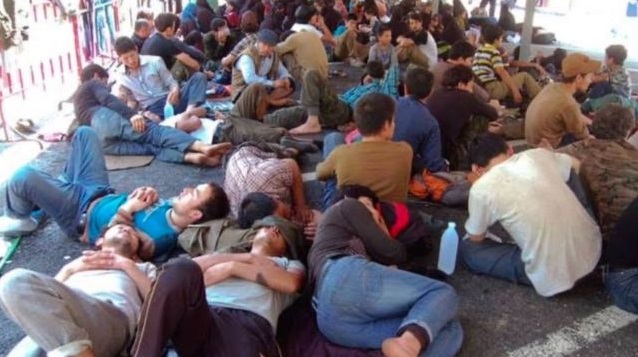Uyghur refugees in hunger strike in a Thailand detention center. Source: World Uyghur Congress.
While 48 refugees in Thailand are threated with forced repatriation, transnational repression invent new ways to reach the Chinese regime’s goals.
by Marco Respinti
Bitter Winter, 02/19/2025
To begin with, the Uyghurs were escaping to Türkiye through Pakistan, an Islamic country which borders XUAR. Under pressure from the PRC, however, since 2015 Pakistan ceased to be a safe haven for the escaping Uyghurs. The Pakistani police have been apprehending Uyghur people seeking shelter, collecting their biometric data, and deporting them back to an uncertain future in the PRC. Having signed in 2013 a Memorandum of Understanding toward what is called the “China Pakistan Economic Corridor” (a 3,000 km Chinese infrastructure network project currently under construction in Pakistan as part of Beijing’s “Belt and Road Initiative,” BRI), Islamabad now has little option but to kowtow to the Chinese government.
Though created as a Muslim nation, for the lure of Chinese money Pakistan no longer cares for the oppression that hits fellow Muslim Uyghurs in XUAR. After Pakistan signed an extradition treaty with the PRC in 2003, which was then also furtherly implemented through other agreements, Islamabad arrests Uyghurs under the instruction of Beijing.
The route through Pakistan having become dangerous, the Uyghur escapees now use an alternative route through Southeast Asia to Malaysia where they are helped to obtain forged travel documents to Türkiye.
The escaping Uyghur people then manage to reach Thailand from the PRC via Vietnam and Cambodia, crossing the borders illegally as they do not have travel documents. But the Thai government is also under pressure from Beijing to deport the Uyghurs who take shelter in Bangkok and get them arrested. Being the largest trading partner of Thailand and the largest foreign investor in a close relationship that is continually growing, the PRC arm-twists Thailand which has also lately finalized a deal with Beijing to buy—a few technical problems notwithstanding—a submarine. Only a lucky few among the Uyghurs can finally reach Türkiye.
Unfortunately, however, Türkiye too is now letting down the Uyghur people who have taken shelter there and is secretly deporting them to the PRC. Being a Muslim country itself, Türkiye is now similarly betraying fellow Muslim Uyghurs.
“Bilateral relations between Ankara and Beijing were elevated to the level of ‘strategic cooperation’ in 2010,” says the Ministry of Foreign Affairs of Türkiye. Ankara joined BRI in 2015 and in July 2024 BYD Auto, the Chinese manifacturer of electric vehicles, announced to invest $1 billion to set up a plant in Türkiye to produce 150,000 vehicles a year. In the process, Türkiye recorded a huge trade deficit with China of $42 billion in 2023.

To begin with, the Uyghurs were escaping to Türkiye through Pakistan, an Islamic country which borders XUAR. Under pressure from the PRC, however, since 2015 Pakistan ceased to be a safe haven for the escaping Uyghurs. The Pakistani police have been apprehending Uyghur people seeking shelter, collecting their biometric data, and deporting them back to an uncertain future in the PRC. Having signed in 2013 a Memorandum of Understanding toward what is called the “China Pakistan Economic Corridor” (a 3,000 km Chinese infrastructure network project currently under construction in Pakistan as part of Beijing’s “Belt and Road Initiative,” BRI), Islamabad now has little option but to kowtow to the Chinese government.
Though created as a Muslim nation, for the lure of Chinese money Pakistan no longer cares for the oppression that hits fellow Muslim Uyghurs in XUAR. After Pakistan signed an extradition treaty with the PRC in 2003, which was then also furtherly implemented through other agreements, Islamabad arrests Uyghurs under the instruction of Beijing.
The route through Pakistan having become dangerous, the Uyghur escapees now use an alternative route through Southeast Asia to Malaysia where they are helped to obtain forged travel documents to Türkiye.
The escaping Uyghur people then manage to reach Thailand from the PRC via Vietnam and Cambodia, crossing the borders illegally as they do not have travel documents. But the Thai government is also under pressure from Beijing to deport the Uyghurs who take shelter in Bangkok and get them arrested. Being the largest trading partner of Thailand and the largest foreign investor in a close relationship that is continually growing, the PRC arm-twists Thailand which has also lately finalized a deal with Beijing to buy—a few technical problems notwithstanding—a submarine. Only a lucky few among the Uyghurs can finally reach Türkiye.
Unfortunately, however, Türkiye too is now letting down the Uyghur people who have taken shelter there and is secretly deporting them to the PRC. Being a Muslim country itself, Türkiye is now similarly betraying fellow Muslim Uyghurs.
“Bilateral relations between Ankara and Beijing were elevated to the level of ‘strategic cooperation’ in 2010,” says the Ministry of Foreign Affairs of Türkiye. Ankara joined BRI in 2015 and in July 2024 BYD Auto, the Chinese manifacturer of electric vehicles, announced to invest $1 billion to set up a plant in Türkiye to produce 150,000 vehicles a year. In the process, Türkiye recorded a huge trade deficit with China of $42 billion in 2023.

Beijing is now putting pressure on Turkey to sign an extradition treaty with China. If ratified by the Turkish Parliament, this treaty will have a devastating effect on the 50,000-strong Uyghur diaspora in Tūrkiye.
The case of those 48 Uyghurs threatened with deportation while they live inhuman condition in Thai prisons is highly revealing. It is in fact a clear exposition of the way by which the PRC operates abroad through other countries. While the famed NGO Freedom House has identified China as the most prolific perpetrator of the practice of transnational repression, it appears that among the most evident PRC’s international allies there are countries identifying themselves as Muslim or where the majority of the population is Muslim. For people in XUAR, mostly Muslim, this is a second stab in their back.

